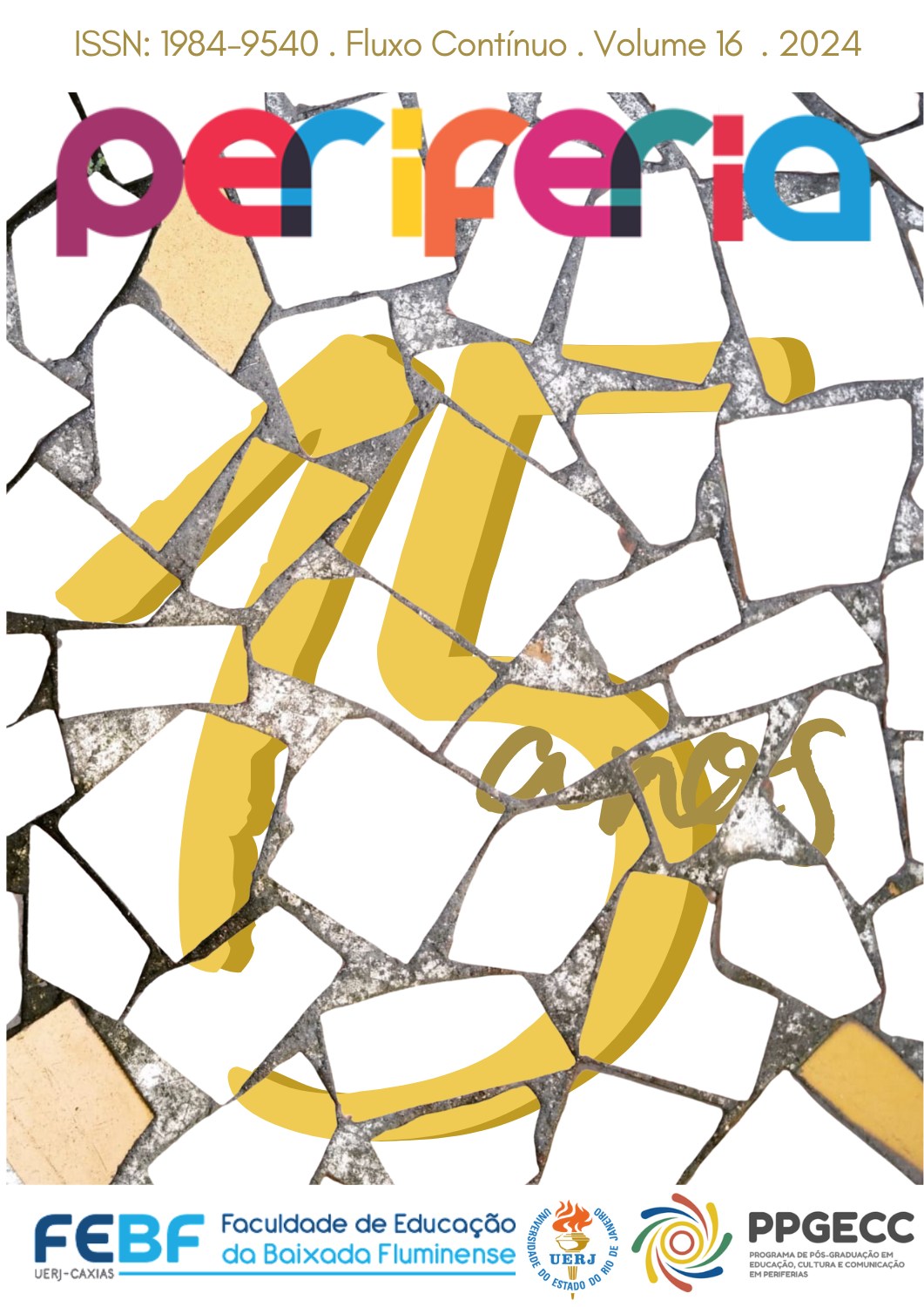APRESENTAÇÃO DO DOSSIÊ
DISCURSOS E PRÁTICAS ESTÉTICO-SOCIAIS, COMUNICACIONAIS E EDUCACIONAIS NAS PERIFERIAS DO BRASIL E DO SUL GLOBAL: sentidos, imaginários e vivências nas margens
DOI:
https://doi.org/10.12957/periferia.2024.88687Resumo
.
Referências
ANZALDÚA, Gloria. Borderlands/La Frontera: the new mestiza. 4. ed. San Francisco: Aunt Lute Books, 2012.
BHABHA, Homi K. The location of culture. London: Routledge, 1994.
CANDIDO, Antonio. Vários escritos. Rio de Janeiro: Outro sobre azul, 2011.
CASTELLS, Manuel. Communication power. Oxford: Oxford University Press, 2009.
CASTRO ROCHA, João César. O direito à leitura literária. In: PINHEIRO, Marta Passos et. al. (Org.) Linguagens e tecnologias: arte, ensino e edição. Presidente Prudente: CNPq Conte, 2020, p. 34-58.
CELINA, Lindanor. Eram seis assinalados. Belém: CEJUP, 1994.
EVARISTO, Conceição. Olhos d’água. São Paulo: Pallas, 2014.
FERRÉZ. Terrorismo literário. In: FERRÉZ (org.). Literatura marginal: talentos da escrita periférica. São Paulo: Agir, 2005.
FOUCAULT, Michel. A arqueologia do saber. Rio de Janeiro: Forense Universitária, 2008.
FREIRE, Paulo. Pedagogia da autonomia: saberes necessários à prática educativa. 43. ed. São Paulo: Paz e Terra, 2016.
GONZALEZ, Lélia. Por um feminismo afro-latino-americano. Rio de Janeiro: Zahar, 2020.
HALL, Stuart. Representation: cultural representations and signifying practices. 2. ed. London: SAGE, 2013.
HOOKS, bell. Ensinando a transgredir: a educação como prática da liberdade. São Paulo: Martins Fontes, 2017.
JACOMEL, Mirele Carolina Werneque. Relações de poder e a literatura brasileira. Revista Grifos, v. 18, n. 26, p. 7-16, 2009.
KARNOPP, Lodenir. Literatura surda. ETD – Educação temática digital, v. 7, n. 2, p. 98-109, 2006.
MORIN, Edgar. Introdução ao pensamento complexo. 5. ed. Porto Alegre: Sulina, 2007.
MORIN, Edgar. Os sete saberes necessários à educação do futuro. Tradução Catarina Eleonora F. da Silva e Jeanne Sawaya. São Paulo: Cortez; Distrito Federal: Unesco, 2000.
PEIXOTO, Janaína Aguiar. A tradição literária no mundo visual da comunidade surda brasileira. João Pessoa: CCTA, 2020.
SILVA, Paulo Vinicius Baptista da; BORBA, Carolina dos Anjos de. Políticas Afirmativas na Pesquisa Educacional. Educ. Rev., Curitiba, v. 34, n. 69, p. 151-191, 2018.
SIMON, Herbert A. The sciences of the artificial. 3. ed. Cambridge: MIT Press, 1996.
SPIVAK, Gayatri Chakravorty. Can the subaltern speak?. In: NELSON, Cary;
GROSSBERG, Lawrence. Marxism and the interpretation of culture. London: Macmillan, 1988. p. 271-313.
SPIVAK, Gayatri Chakravorty. Pode o subalterno falar? 1. ed. Trad. Sandra Regina Goulart Almeida; Marcos Pereira Feitosa; André Pereira. Belo Horizonte: Editora da UFMG, 2010.
VAZ, Sérgio. Literatura das ruas. In: VAZ, Sérgio. Literatura, pão e poesia. São Paulo: Global, 2011.
VICTORA, Cesar G.; MOREIRA, Carmen B. Publicações científicas e as relações Norte-Sul: racismo editorial? Revista de Saúde Pública, v. 40, p. 36-42, 2006.
Downloads
Publicado
Como Citar
Edição
Seção
Licença
Autores que publicam nesta revista concordam com os seguintes termos:- Autores mantém os direitos autorais e concedem à revista o direito de primeira publicação, com o trabalho simultaneamente licenciado sob a Creative Commons Attribution License que permitindo o compartilhamento do trabalho com reconhecimento da autoria do trabalho e publicação inicial nesta revista.
- Autores têm autorização para assumir contratos adicionais separadamente, para distribuição não-exclusiva da versão do trabalho publicada nesta revista (ex.: publicar em repositório institucional ou como capítulo de livro), com reconhecimento de autoria e publicação inicial nesta revista.
- Autores têm permissão e são estimulados a publicar e distribuir seu trabalho online (ex.: em repositórios institucionais ou na sua página pessoal) a qualquer ponto antes ou durante o processo editorial, já que isso pode gerar alterações produtivas, bem como aumentar o impacto e a citação do trabalho publicado (Veja O Efeito do Acesso Livre).







